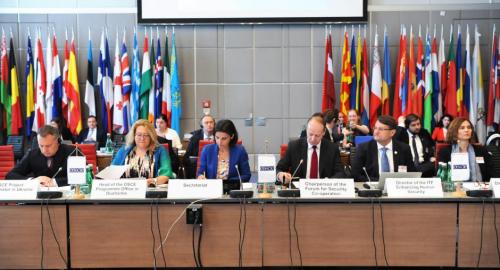OSCE’s work in mine action and global efforts to address threat posed by land mines in focus at OSCE Forum for Security Co-operation
With the number of people killed or injured globally by landmines having doubled in the last five years, the OSCE Forum for Security Co-operation (FSC) meeting in Vienna, held under Slovenia’s Chairmanship, focused on the threat posed by these “silent killers” and on the different approaches the OSCE is taking in affected states to address this challenge.

Speakers of the OSCE Forum for Security Co-operation meeting address the Security Dialogue on the role of mine action in all phases of the conflict cycle, Vienna, 4 July 2018.
Opening the meeting, Ambassador Andrej Benedejčič, Chairperson of the Forum and Permanent Representative of Slovenia to the OSCE, said that demining is of great importance to Slovenia, and in 1998 the country established a humanitarian, non-profit organization - ITF Enhancing Human Security - to support mine clearance in Bosnia in Herzegovina.
“One of the challenges that still affects the Western Balkans, but also concerns other OSCE regions, is the issue of land mines. In fact, this is again becoming an alarmingly topical concern, with the global number of land mine victims doubling in the past five years,” said Ambassador Benedejčič. “The OSCE is well aware of this regrettable trend. A little more than a year ago a member of the Special Monitoring Mission to Ukraine was lost to one of these ‘silent killers.’”
ITF Enhancing Human Security, which is now present around the world, and this year marks its 20th anniversary, has at its core a human-centred approach, as individuals and societies suffer most from landmines and unexploded remnants of war, said the organization’s director, Ambassador Tomaž Lovrenčič.
“It is important to emphasize that humanitarian mine action can only be effective if demining work is complemented by mine risk education, mine victims assistance, stockpile destruction and advocacy,” he said. “Land mines hinder any possible development and importantly aggravate the humanitarian situation in affected countries, so it is of utmost importance for the international community to ensure an environment that is conducive to demining, assisting mine victims and other vital elements of mine action.”
Highlighting the gender perspective in line with the recurring theme of Slovenia’s FSC Chairmanship, Arianna Calza Bini, the Director of the Gender and Mine Action Programme, an international expert organization based in Geneva, said gender has a significant impact on the consequences of conflict and mine contamination: the majority of direct victims are men and boys, whilst the majority of indirect victims are women and girls.
“Including gender in mine action is vital to avoid exacerbating inequalities, but also to make sure that mine action operations and activities reach and benefit all groups in a community,” she said. “By engaging women in all aspects of mine action, from clearance to data collection, victim assistance and mine risk education, mine action operations are more inclusive, and better represent the concerns, and priorities of women and girls.”
The Forum for Security Co-operation then heard from two heads of OSCE Field Operations, who shared perspectives from the OSCE’s work on the ground.
“The OSCE’s added value to mine action stems from its holistic and cross-dimensional approach to security,” said Ambassador Tuula Yrjölä, Head of the OSCE Programme Office in Dushanbe. “In Central Asia, the Programme Office supports Mine Action and Explosive Hazards Reduction as a platform for co-operation, building capacities as well as sharing experience and best practices among governments, ministries and institutions.”
She added that Tajikistan is close to being declared a mine-free country but additional funding and support is necessary to help them reach this goal.
Ambassador Vaidotas Verba, OSCE Project Co-ordinator in Ukraine, highlighted two project proposals developed in 2016 in response to the needs of national authorities in the humanitarian demining.
“The OSCE Project Co-ordinator is supporting authorities in developing national mine action standards, as well as establishing procedures for quality assurance and quality control,” he said. “The projects aim to build humanitarian mine action capacity by focusing on a legal framework for humanitarian demining operations, to set up a mine action information management system and to facilitate the exchange of experiences in this domain.”
Source: Organization for Security and Co-operation in Europe
- 216 reads
Human Rights
Ringing FOWPAL’s Peace Bell for the World:Nobel Peace Prize Laureates’ Visions and Actions

Protecting the World’s Cultural Diversity for a Sustainable Future

The Peace Bell Resonates at the 27th Eurasian Economic Summit

Declaration of World Day of the Power of Hope Endorsed by People in 158 Nations

Puppet Show I International Friendship Day 2020

